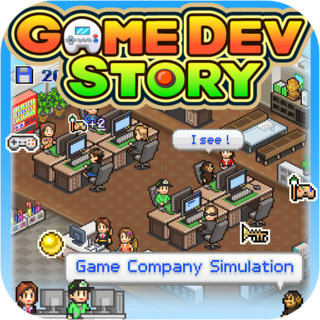GameDevStory is an addictive little gem- while it lasts.
In an age where the iPhone has come into its own as a gaming device, with slick HD graphics and the implementation of the accelerometer and touch controls taking charge, GameDevStory appears almost quaint, an isometric pixellated game that looks like it would have been right at home on the Super Nintendo. It's a simulation title that lets the player control a fictional start-up game development company over a period of 20 years. No specific dates are given, but anyone remotely familiar with console history will know that the game starts in the late 1980s and marches forward from there, as the "fictional" hardware developers release their systems right on time. Intendro creates the Super IES and the Game Kid, Senga releases the Exodus and the Uranus, and so on and so forth. The PC is available throughout, but the path to success doesn't generally involve supporting this platform, though the availability to do so is part of the game's charm.
While it's generally wise to start your path towards becoming the next BioWare or Blizzard by making PC games, the real fun in GameDevStory happens as you hire more employees, increase their abilities, train them to learn new genres and settings, and generally make more money. As you do so, you can purchase the licensing rights to develop for other systems, which generally have a large audience, thereby increasing your sales. Players can help a struggling system gain in prominence, or help a successful launch carry over into relative dominance, by developing quality games for that platform.
After a time and with the right decisions, players can start to develop their own systems, entering the fray with a handheld or console system of their own. A successful run through the game will wind up with the player's development team (which never grows beyond 8 staff members, not counting the window dressing of the CEO and secretaries) becoming the new kings of the video gaming world, with a popular console and lots of popular franchises to make sequels to.
As mentioned, this game is quite addictive. Part of this is the way the game constantly builds momentum. As players hire and improve new employees, they can make better and better games, hopefully increasing sales with each new release, making more money that can be spent on advertising, freelancers with specific talents to help in development, and other elements. The real reason this game is so addictive, however, is that there is no natural stopping point. As soon as a game is finished and reviewed by the Famitsu-like critics (four critics with a range of 1-10 for a cumulative score of 4-40), the game's clock continues on, and the player must start up development on a new console, a game, or some contract work (to raise capital without the cash investment a new game requires to begin). With a few events scattered throughout the year and projects constantly in development, the only time the game actually stops is when the 20th year ends, at which point the player will likely have millions to billions in cash on-hand.
Part of the reason for this is that the game is fairly easy. It can be lean times starting out, but as the games sell more and the staff becomes more talented, the sales numbers continue to rise, and it's rare for the player to be in any real danger of running out of cash. Players can even go into the negative so long as they don't have to begin a new game with negative cash flow. Since even mediocre games tend to turn a profit, failing would actually take some effort.
GameDevStory isn't a very deep game, but it's a compulsive little gem that will devour a weekend easily.Some of the progress from a play-through carries over to the next, but it's hard to imagine that most players will want to take more than 2 or 3 tours through the game, tops, though each run through the game is roughly 8-10 hours. It's cute and it's fun and the aesthetic is charmingly retro, and it provides lots of value for the cost, especially if purchased on sale. It's an easy recommendation with just one caveat: clear a weekend ahead of time. While it lasts, GameDevStory is an addictive little gem.
--
Jonathan Leard

